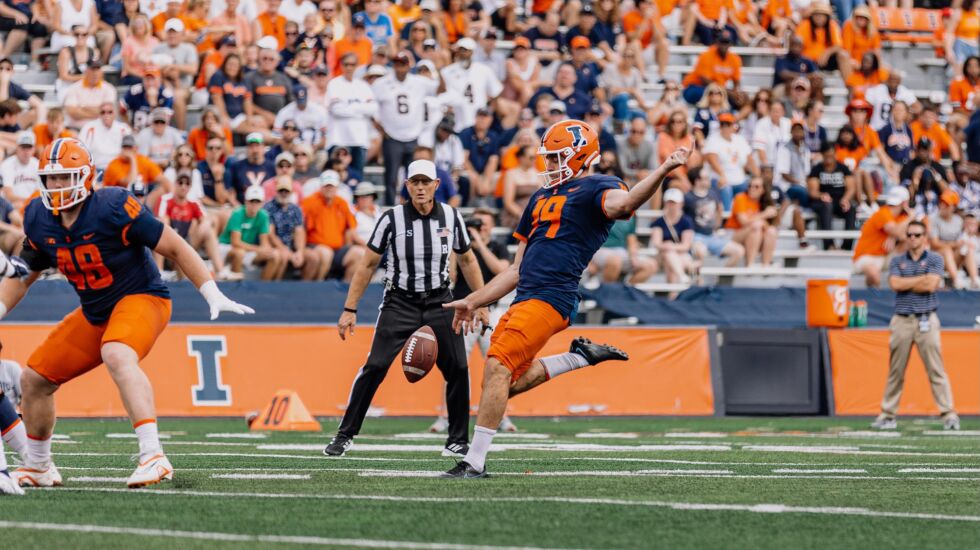
Like a lot of older teenagers, Hugh Robertson didn’t know what he wanted to do with his life as the end of secondary school approached in Kilmore, a town outside Melbourne, Australia. He was on a path — to study engineering in the big city — but something about that just didn’t sit right in his gut.
So what did he do about it?
Intended or not, he embarked on an adulthood that — roughly 10 years later — has to make the Illinois punter, a redshirt freshman at the tender age of 29, as interesting as any player in college football.
First, Robertson deferred from university to spend what’s commonly referred to as a “gap year” in the Australian army. After that, he put in seven years — four of them in Melbourne, a city of over 5 million — as a police officer. All the while, he was a high-level Australian rules footballer.
And now?
“He’s Uncle Hugh,” said Illini punter Caleb Griffin. “That’s what we call him.”
Robertson is riding the wave of a massive trend in the college game toward punters from Australia. And not just punters, but older ones at that. And not just older punters, but specifically trained ones through a booming program called ProKick Australia, the director of which is Nathan Chapman, who gave punting a whirl after his Australian Football League career and made it as far as training camp with the Packers in 2004.
Australian punters are everywhere in the major-college ranks and have claimed six of the last nine Ray Guy awards, the top honor nationally at the position. This season, of the oldest eight players in the Football Bowl Subdivision, seven are punters. All of them have the Aussie rules sport — played with an oval ball, with points awarded for kicks through goal posts — and ProKick training in their backgrounds.
Only Oklahoma State’s Tom Hutton, 32, and East Carolina’s Luke Larsen, 30, are older than Robertson, who will be 30 in January. The oldest non-punter is North Texas quarterback Austin Aune, 28, who spent six seasons in the New York Yankees organization.
“You’re picking up a different level of maturity with these guys,” said Illinois special teams coordinator Sean Snyder, “as well as where they are with their lives and what they’ve experienced.”

Snyder — a one-year fill-in for Ben Miller, who’s on leave after being diagnosed with colon cancer in February — previously coached punter Ben Griffiths at USC. Griffiths, who turned 30 in his final season, was another interesting dude, enormous at 6-7, 240 and a former AFL star whose professional heyday had been cut short by a series of concussions.
Robertson arrived in college football with less fanfare, but he was thankful — if a bit anxious — when he moved to Champaign at 26 to begin down a new path. And could it be more different?
As a cop, he had mundane days and terrifying ones; he enjoyed the work but at times carried a burden of tremendous stress. Robertson has spoken with Chicago cops who certainly encounter more violence and darkness than he did in Melbourne, but do understand this is a college punter who has responded to domestic-violence calls and car crashes, processed suicides and murder scenes, been physically attacked and seen quite enough of all that for a good long while.
“I can’t tell you how many times I had to make an arrest or go into a house where I was very uncomfortable,” he said. “I think maybe it was part of the reason why I wanted a change.”

These days, he’s majoring in business management and minoring in international business. He’s 13 punts — the longest a 51-yarder — into his first season as a starter. He’s fending off “old man” cracks from teammates by claiming to have much in common with 45-year-old Tom Brady. He’s enjoying his new surroundings, which aren’t all that unlike the country town where he lived with his family.
He’s surely learning to get by as an Illinoisan. Case in point:
“Italian beef — wet, with sweet and hot peppers — goes down very well,” he said.
The first time the 6-2, 225-pounder tried punting, he wore soccer cleats. Now, he speaks in terms of punting for as long as his body will cooperate.
“The NFL is something I really want to do,” he said.
And why not? You only live once.
“I was 26 at the time I quit my job,” he said, “and I had a lot of anxiety toward taking this path. But now I’m committed to it, and, really, I couldn’t be any more happy.”







